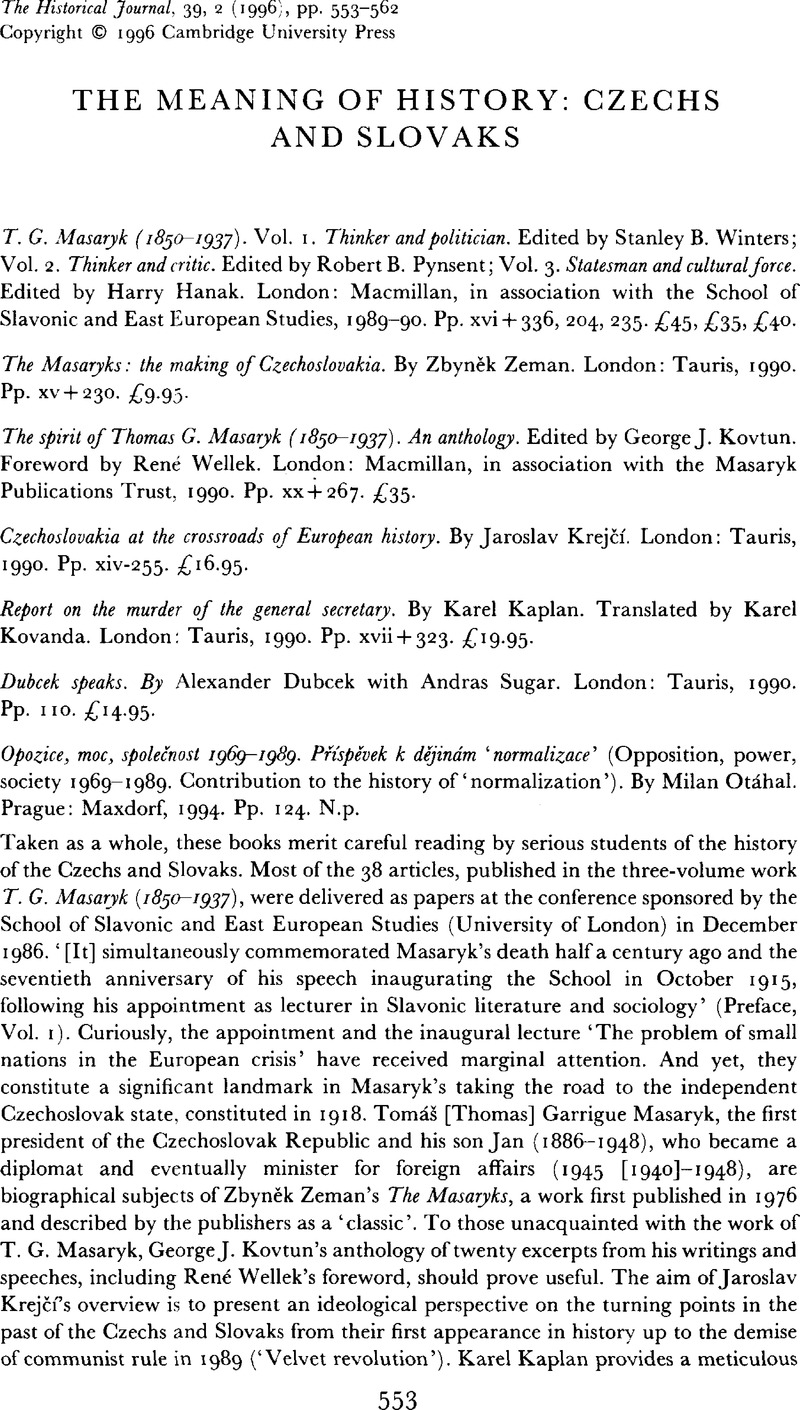No CrossRef data available.
Published online by Cambridge University Press: 11 February 2009

1 Milan Otàhal helped to put together Sedm pražských dnů 21.–27. srpen 1967 (1968)Google Scholar. The publication, prepared by the Historical Institute of the Czechoslovak Academy of Sciences, contains a documented account of seven days in the wake of the Soviet-led invasion of Czechoslovakia in August 1968. The English version The Czech black book (edited by Littell, R)Google Scholar was published by F. A. Praeger (New York-Washington-London) in 1969. He was also a signatory of Charter 77 and has co-edited with Zdeněk, SládekDeset Pražských dnů 17-27. listopad 1989 Documentace (Prague, 1990)Google Scholar (Ten Prague days 17–27 November 1989. Documentation).
2 Havelka, M (ed.), Spor o smysl českých dějin 1895–1938 (The controversy about the meaning of Czech history 1895–1938) (Prague, 1995), p. 7.Google Scholar
3 Česká otázka (The Czech question) (1895); Naše nynějši krise (Our present crisis) (1895); Jan Hus (1896); Karel Havlíček (1896).
4 Masaryk, T. G., The meaning of Czech history (edited and with an introduction by Wellek, R, translated by Kussi, P) (Chapel Hill, 1974), pp. 17–18.Google Scholar
5 J., Pekař, ‘Masarykova česká filosofie’ (Masaryk's Czech philosophy), Český časopis historický (Czech Historical Journal), XVIII (1912), 170–208.Google Scholar
6 Hauner, M, ‘The meaning of Czech history: Masaryk versus Pekař, Masaryk, III, 24–42Google Scholar; K., Kučera, ‘Masaryk and Pekaf: their conflict over the meaning of Czech history and its metamorphosis’, Masaryk, I, 88–105Google Scholar. Karel Kučera appears to be the only home-based Czech contributor to the Masaryk volumes. Kucera is described by a knowledgeable student of Masaryk's life and work as ‘an outstanding historian and noble human being’. He sadly died on 5 February 1990. Cf. Opat, J, Filozof a politik T. G. Masaryk 1882–1893 (Philosopher and politician. T. G. Masaryk 1882–1893) (Prague, 1990), p. 11.Google Scholar
7 František Xaver Šalda (1867–1937) – widely respected arbiter in rebus litterariis.
8 Marek, J, O. historismu a dějepisectví (On historism and historiography) (Prague, 1992), p. 168Google Scholar. The book was to be published in 1969. As was the case with other works of historical scholarship, its publication was prevented by the oppressive political system instituted as part of the backlash (‘normalization’), prompted by the downfall of the ‘Prague spring’. The delay has not affected Marek's balanced, albeit concise, treatment of the Masaryk–Pekař debate.
9 Cf. Urban, O, Česká společnosl 1848–1918 (Czech society 1848–1918) (Prague, 1982), p. 610.Google Scholar
10 According to an admittedly hostile account, Pekař eventually declined, pleading old age, loss of memory and ill-health. Cf. Pachta, J, Pekař a pekařovština v českém dějepisectví (Pekař and pekařism in Czech historiography) (Prague, 1950), p. 54Google Scholar. This made way for Bohumil Němec (1873–1966), the distinguished plant physiologist cum politician, to stand unsuccessfully against Eduard Beneš (1884–1948) in the presidential election of 1935. In the ‘Masarykiana’ under review there is nothing on these events that deserves more attention. See also A., Gašpariková-Horáková, U Masarykovcov Spomienky osobnej archivárky T. G. Masaryka (With the Masaryks: reminiscences of T. G. Masaryk's personal archivist) (Bratislava, 1995), pp. 262, 265Google Scholar. I am most grateful to Dr E. Kubů for this reference.
11 Svoboda, G. J., ‘Robert J. Kerner and US conception of Czechoslovak independence’, III, 43–56.Google Scholar
12 George, Wightman, ‘T. G. Masaryk and the Czechoslovak legion in Russia’, III, 57–70.Google Scholar
13 It is against this background that the delayed evacuation of the Czechoslovak legion from Valdivostok, not completed until November 1920, has to be viewed.
14 Scruton, R, ‘Masaryk, Kant and the Czech experience’, I, 44–59 (p. 48).Google Scholar
15 Pynsent, R. B., ‘Masaryk and decadence’, I, 60–83 (P. 60).Google Scholar
16 Wellek, , Meaning, p. XIX.Google Scholar
17 It has received minimal attention in Marzik, T. D., ‘The Slovakophile relationship of T. G. Masaryk and Kárel Kalal prior to 1914’, I, 191–209Google Scholar, and is briefly referred to in Wallace, W. V., ‘Masaryk and Beneš and the creation of Czechoslovakia: a study in mentalities’, III, 71–85Google Scholar. The author's conclusion is: ‘Arguably, neither of them [Masaryk and Beneš – M.T.] fully understood what being Slovak really meant’ (p. 78).
18 Masaryk, T. G., Otázka sociální. Základy marxismu filosojické a sociologické (The social question. The philosophical and sociological foundations of Marxism), 2 vols. (Prague, 1898)Google Scholar. The work is discussed by Lochman, J. M., ‘Masaryk's quarrel with Marxism’, II, 220–33.Google Scholar
19 Cf. ‘I have no fear for democracy, anti-democratic movements are reactionary. Bolshevism is a more difficult problem’ in Zeman, p. 153. Quotation from the biography by Herben, J, T. G. Masaryk (Prague, 1947).Google Scholar
20 Seton-Watson, R. W., A history of the Czechs and Slovaks (Hamden, 1965), pp. 366–7.Google Scholar
21 Cf. ‘The Russian Revolution or, more precisely, the Bolshevik revolution of October 1917…became an event as central to the history of this century as the French Revolution of 1789 was to the nineteenth’. Hobsbawm, E, Age of extremes: the short twentieth century 1914–1991 (London, 1994). P. 55.Google Scholar
22 Quoted in Hill, C, Reformation to industrial revolution (Harmondsworth, 1969), p. 16.Google Scholar